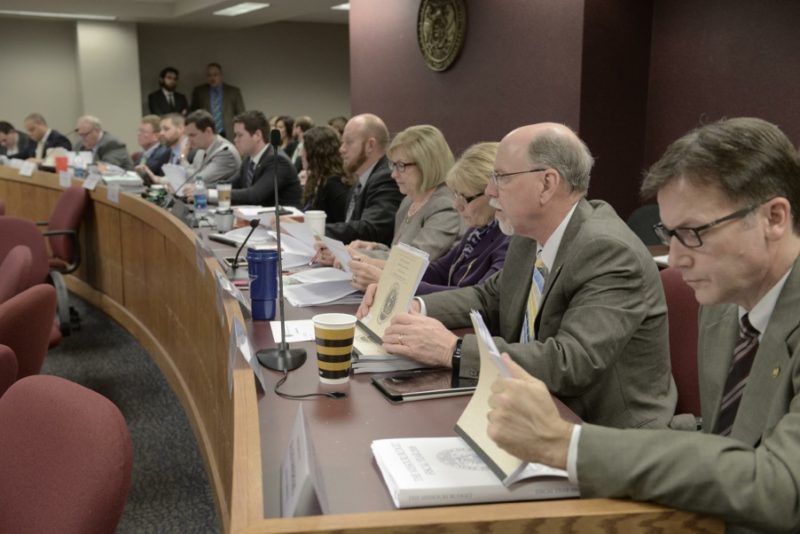JEFFERSON CITY, Mo. – Tension grew in the House Budget Committee Tuesday afternoon when lawmakers’ questioned the Office of Administration’s budget noted Capitol improvement bonds were used to pay for the new security upgrades inside the Missouri State Capitol.
Members of the committee balked at the thought that some of the $40 million in bonds approved for Capitol improvements in the 2016 budget were put toward the installation of metal detectors and increased security guards at several entrances. The state spent more than $415,000 to purchase and install the new equipment, including three metal detectors, 25 hand-held metal-detector wands, and equipment for the electronic badge scanners at locked doors.
Those upgrades, along with a ban on concealed weapons, were put into effect on Jan. 10, the day after Gov. Eric Greitens was sworn in.
Committee members grilled Cathy Brown, the Office of Administration’s Director of Facilities Management, Design and Construction Division (FMDC), over the issue for nearly an hour on the subject, questioning how and why the security changes fell under a renovations project.
Brown says that both the House and Senate leadership, along with the Governor’s Office, approved the security changes in the 2016 budget.
“They all approved of these security changes, is that correct? Or were they merely informed? Because being informed is not the same thing as giving consent in my mind,” Rep. Curtis Trent asked.
“It’s my understanding that they all agreed,” Brown said.
Brown says she was only involved in maybe a quarter of the conversations concerning the security upgrades, as then-Director of the Office of Administration Doug Nelson handled the majority of the conversations. Nelson was relieved of his duties a few weeks before Sarah Steelman was named the new director.
“You’re not aware if there was any agreement in writing where all of these parties signed off on it, or whether we’re just supposed to take everyone’s word that consent was given at some stage, at some formal conversation, is that correct?” Trent continued.
“That is correct,” Brown said.
She also noted that the Joint Committee on Legislative Research had to approve all projects, meaning that members of both chambers were involved in the issuance of the bonds. She also said that the discussion in that committee did entail the security project.
“Is there any limitation to what you can change in this building?” Trent asked. While it could be taken as a joke, his question pointed out that OA’s authority holds little in terms of limited power.
Stacy Neal answered, saying that OA did not have any authority in terms of the furniture inside the Capitol.
The representatives also questioned why Missouri State Highway Patrol troopers were being stationed at the doors, saying that if more personnel was needed to man the doors, why didn’t the Capitol Police hire more people?
Brown responded, saying that they have also contracted with a service to place unarmed guards at the entrances until June 30. These guards are paid using OA’s FMDC operations budget, but at the beginning of the 2018 fiscal year, the funds would come from the Department of Public Safety.
Rep. Scott Fitzpatrick, the chairman of the committee, said that he is a member of the joint committee, and said that any blame partly falls on the Legislature. But he also made it clear that every piece of legislation would be heavily scrutinized going forward.
“Look, we authorized the issuance of bonds, but I don’t recall all of the details of everything,” he said. “I find it unlikely that I’m going to give you guys any blanket authority to do whatever you want to do on this building, so the committee, especially myself, is going to need to understand exactly how every dollar is going to be spent on these bond proceeds from here on out before I pass any bill out of this committee.
“So, if you have any interest in doing anything on that, we should probably talk sometime soon.”
Fitzpatrick did say that he thought that the situation would take some time to die off.
“None of this is directed at any one person,” Fitzpatrick said. “I think we’re getting some alternative facts. I’m not sure the Speaker would agree that he signed off on all of these metal detectors at every entrance of the Capitol. You may have gotten that information from people that were in the room.
“I think we’ll get on the same page, but I think we probably need to give the committee the opportunity to go and see what these bonds are going to, so we know what we are voting on,” Fitzpatrick finished.
Benjamin Peters was a reporter for The Missouri Times and Missouri Times Magazine and also produced the #MoLeg Podcast. He joined The Missouri Times in 2016 after working as a sports editor and TV news producer in mid-Missouri. Benjamin is a graduate of Missouri State University in Springfield.








